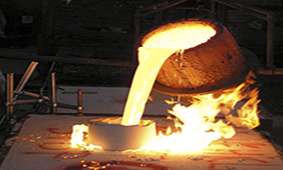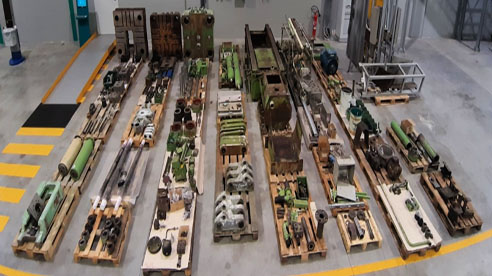
As good as new: How remanufacturing can transform die-casting performance

The secret to any successful die-casting operation is efficiency. A machine that reliably creates perfect parts using optimum energy with maximum uptime will generate a handsome return on investment. At a certain point in time, foundries need to invest in a new machine. Remanufacturing offers an alternative solution.
Three benefits to remanufacturing
Bühler Brescia, a remanufacturing specialist in Bedizzole, Italy, covers everything from smaller machines with 2,600 kN locking force, up to the largest at 22,000 kN. The purpose-built facility offers a choice of full remanufacturing or partial remanufacturing that may focus on upgrades to the control, injection, drive or closing units, and safety devices.
In the last five years, Bühler Brescia in Bedizzole and its sister plants in the US and China have fully or partially remanufactured over 300 machines.
Giovanni Triulzi, Managing Director of Bühler Brescia, says that remanufacturing’s growth in popularity is due to three key benefits. “Customers usually approach us because they are beginning to see a decline in product quality or cell uptime, which is compromising their overall output. With years of die-casting experience, we know how remanufacturing can effectively reset the production clock to zero and get them back to the reliable performance they enjoyed when a machine was new. Secondly, customers see remanufacturing as a way to extend the return on their original investment. If we can give them years of efficient performance from a remanufactured machine, that can make a compelling economic business case. Thirdly, technology in die casting has moved at an incredible pace over the last 10 to 15 years. Being able to introduce innovations, such as the intuitive DataView control unit or improved operator protection can help foundries transform overall performance.”
How does the process work?
Once a customer commits to remanufacturing, the machine is shipped to Bühler Brescia’s state-of-the-art facility in Bedizzole. Here the machine is stripped right down to its component parts. Once each part has been cleaned and inspected, Bühler’s expert engineers make a detailed analysis. Triulzi explains: “We will already have agreed a strategy with the customer before we start. Once we have the machine stripped, we invite the customer to visit. Together, we then agree a detailed plan of what will need to be replaced, upgraded or renovated to give the best possible future performance.”
What does remanufacturing entail?
The process here is well beyond a servicing operation. Each critical component is carefully cleaned, machined or replaced to meet the finest tolerances. Where possible, newer technology may be introduced that can give customers an advantage in cycle times, cell uptime, control and management. The whole machine is then repainted, reassembled and fully tested in the Center, before being shipped to the customer’s foundry, where it is installed and recommissioned for production. Triulzi says that remanufactured machines can then be as good as new. And are just as easy to maintain. “Of course, at Bühler Brescia, we only use approved parts, which ensures that availability of spare parts and ongoing servicing and maintenance will be easy to manage for many years to come.”
What can remanufacturing achieve?
Full or partial remanufacturing can give customer’s production capability an important new lease of life. A spokesperson for Alupress S.P.A. in Brixen, the aluminum die-casting specialist says: “Thanks to the refurbishments carried out, we were able to significantly extend the life cycle of our machines. Global support and the availability of spare parts were further important factors in choosing Bühler.”
Future-proofing machines for years to come
Triulzi says that digital control is often one of the most significant upgrades. “Some machines have very basic control options. By upgrading to our latest DataView control system, the remanufactured machine will be much easier to operate through a new multi-touch screen. Customers can take advantage of things like shot curve programming to cut set-up times too. By making their machine ready for the digital age, customers can also take advantage of future innovations that we’re developing as part of our vision of the Digital Cell.”



Trump weighs using $2 billion in CHIPS Act funding for critical minerals

Codelco cuts 2025 copper forecast after El Teniente mine collapse

Electra converts debt, launches $30M raise to jumpstart stalled cobalt refinery

Barrick’s Reko Diq in line for $410M ADB backing

Abcourt readies Sleeping Giant mill to pour first gold since 2014

Nevada army depot to serve as base for first US strategic minerals stockpile

SQM boosts lithium supply plans as prices flick higher

Viridis unveils 200Mt initial reserve for Brazil rare earth project

Tailings could meet much of US critical mineral demand – study

Kyrgyzstan kicks off underground gold mining at Kumtor

Kyrgyzstan kicks off underground gold mining at Kumtor

KoBold Metals granted lithium exploration rights in Congo

Freeport Indonesia to wrap up Gresik plant repairs by early September

Energy Fuels soars on Vulcan Elements partnership

Northern Dynasty sticks to proposal in battle to lift Pebble mine veto

Giustra-backed mining firm teams up with informal miners in Colombia

Critical Metals signs agreement to supply rare earth to US government-funded facility

China extends rare earth controls to imported material

Galan Lithium proceeds with $13M financing for Argentina project

Kyrgyzstan kicks off underground gold mining at Kumtor

Freeport Indonesia to wrap up Gresik plant repairs by early September

Energy Fuels soars on Vulcan Elements partnership

Northern Dynasty sticks to proposal in battle to lift Pebble mine veto

Giustra-backed mining firm teams up with informal miners in Colombia

Critical Metals signs agreement to supply rare earth to US government-funded facility

China extends rare earth controls to imported material

Galan Lithium proceeds with $13M financing for Argentina project

Silver price touches $39 as market weighs rate cut outlook

















